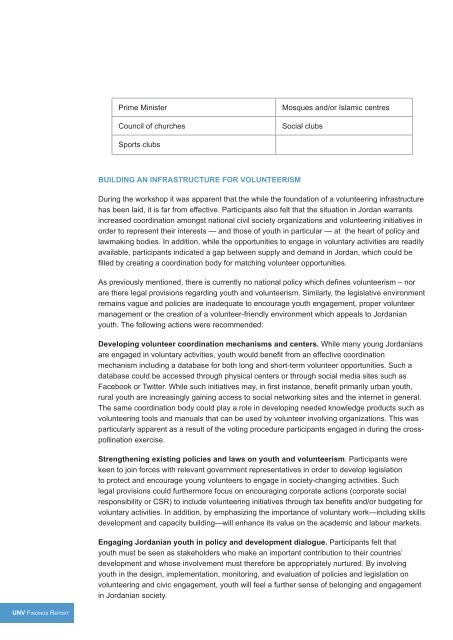J7rQWv
J7rQWv
J7rQWv
You also want an ePaper? Increase the reach of your titles
YUMPU automatically turns print PDFs into web optimized ePapers that Google loves.
Prime Minister<br />
Mosques and/or Islamic centres<br />
Proposed Partners:<br />
Council of churches<br />
Sports clubs<br />
Social clubs<br />
Parliament<br />
Royal court<br />
Prime Minister<br />
Media<br />
BUILDING AN INFRASTRUCTURE FOR VOLUNTEERISM<br />
During the workshop it was apparent that the while the foundation of a volunteering infrastructure<br />
has been laid, it is far from effective. Participants also felt that the situation in Jordan warrants<br />
increased coordination amongst national civil society organizations and volunteering initiatives in<br />
order to represent their interests — and those of youth in particular — at the heart of policy and<br />
lawmaking bodies. In addition, while the opportunities to engage in voluntary activities are readily<br />
available, participants indicated a gap between supply and demand in Jordan, which could be<br />
filled by creating a coordination body for matching volunteer opportunities.<br />
Youth<br />
Training organizations<br />
NGOs<br />
Government<br />
Youth institutions<br />
Higher council of private<br />
schools<br />
Royal family<br />
As previously mentioned, there is currently no national policy which defines volunteerism – nor<br />
are there legal provisions regarding youth and volunteerism. Similarly, the legislative environment<br />
remains vague and policies are inadequate to encourage youth engagement, proper volunteer<br />
management or the creation of a volunteer-friendly environment which appeals to Jordanian<br />
youth. The following actions were recommended:<br />
Developing volunteer coordination mechanisms and centers. While many young Jordanians<br />
are engaged in voluntary activities, youth would benefit from an effective coordination<br />
mechanism including a database for both long and short-term volunteer opportunities. Such a<br />
database could be accessed through physical centers or through social media sites such as<br />
Facebook or Twitter. While such initiatives may, in first instance, benefit primarily urban youth,<br />
rural youth are increasingly gaining access to social networking sites and the internet in general.<br />
The same coordination body could play a role in developing needed knowledge products such as<br />
volunteering tools and manuals that can be used by volunteer involving organizations. This was<br />
particularly apparent as a result of the voting procedure participants engaged in during the crosspollination<br />
exercise.<br />
Strengthening existing policies and laws on youth and volunteerism. Participants were<br />
keen to join forces with relevant government representatives in order to develop legislation<br />
to protect and encourage young volunteers to engage in society-changing activities. Such<br />
legal provisions could furthermore focus on encouraging corporate actions (corporate social<br />
responsibility or CSR) to include volunteering initiatives through tax benefits and/or budgeting for<br />
voluntary activities. In addition, by emphasizing the importance of voluntary work—including skills<br />
development and capacity building—will enhance its value on the academic and labour markets.<br />
Engaging Jordanian youth in policy and development dialogue. Participants felt that<br />
youth must be seen as stakeholders who make an important contribution to their countries’<br />
development and whose involvement must therefore be appropriately nurtured. By involving<br />
youth in the design, implementation, monitoring, and evaluation of policies and legislation on<br />
volunteering and civic engagement, youth will feel a further sense of belonging and engagement<br />
in Jordanian society.<br />
DONORS AND FUNDING VOLUNTEERISM<br />
The financing of volunteering initiatives and the voluntary sector was underscored; basic<br />
resources are needed to initiate volunteer programmes or engage in voluntary activities. While<br />
engagement of the private sector is encouraging in Jordan, it is not yet at a satisfactory scale. In<br />
light of the economic situation in the region and, in particular in Jordan, many of the discussions<br />
amongst participants centered on addressing the economic challenges which all Jordanians,<br />
and youth in particular, face. Increasing the accessibility of volunteer opportunities was therefore<br />
prioritized by workshop participants. Given the high unemployment rates for youth and the<br />
benefits that volunteerism brings with regards to employability, different volunteer initiatives<br />
should take into consideration reasonable “incentives” or associated costs to ensure their<br />
sustainability. The following objectives aim at addressing these economic issues in Jordan:<br />
Ensuring sustainable mechanisms for funding voluntary activities through engaging<br />
the private sector. Participants indicated that there is a need to increase awareness among<br />
companies about youth volunteering initiatives both as a means to meet corporate social<br />
responsibility (CSR) obligations and in order to benefit the community. Engaging in voluntary<br />
activities imparts a range so-called “soft skills”, such as leadership, communication and empathy<br />
to private sector staff as well. By encouraging employers to recognise the skills acquired through<br />
volunteering as assets in employees, they will be more inclined to engage and invest in these<br />
skills—particularly for the career development of their young workers.<br />
Creating volunteering programmes within the private sector. The private sector can play a<br />
strong role by developing the employment-related skills of young Jordanians. Participants also<br />
recommended institutionalizing volunteer programmes with the private sector, where young<br />
volunteers can have opportunities for personal development which increase their employability.<br />
Creating incentives for youth to volunteer. By providing incentives such as the reimbursement<br />
of travel expenses, carpooling incentives to bring young volunteers to/from their place of activity,<br />
or the creation of opportunities to engage in volunteering from home, Jordanian youth will be<br />
provided with a broader range of choices with regards to voluntary activities.<br />
UNV Findings Report<br />
Jordan 22


